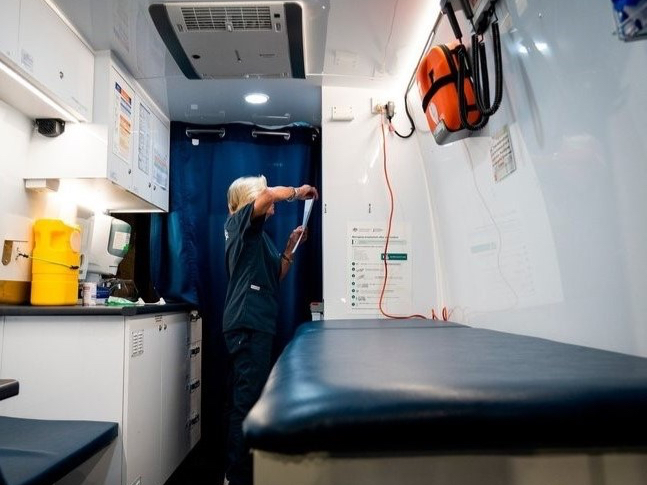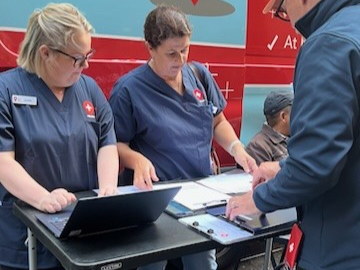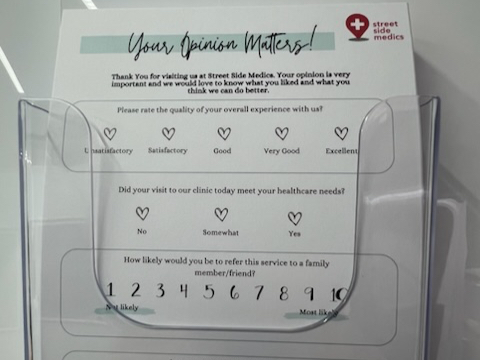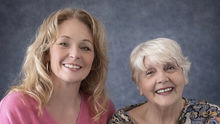Street Side Medics reaching out to Melbourne’s ‘invisible people’
- May 14, 2025
- 8 min read
Updated: May 16, 2025

Hidden away from prying eyes, a transformative mission is quietly unfolding in Melbourne’s buzzing CBD. Each Thursday evening, down a quiet laneway, a distinctive bright blue and red mobile medical van complete with a heart on its door, pulls up opposite the Salvos Project 614 Twilight Café. It’s not just a van; it’s a lifeline. This is Street Side Medics. A free mobile medical service helping those who are vulnerable and experiencing homelessness, and as Salvos Online journalist LERISSE SMITH discovered, it’s changing lives – one person at a time.
It all began with a seizure.
Back in 2019, Dr Daniel Nour, a young trainee doctor from Melbourne, witnessed a man having a seizure at a London station. He instinctively stopped to provide immediate care and called for an ambulance.
But a subsequent chat with the man’s friends revealed a shocking truth: both the man and his friends were homeless and unable to access primary health care. Despite continual seizures, no one was treating the gentleman.

That moment lit a fire in Dr Nour.
Homeless people, he realised, could not access essential health care services due to varying obstacles and barriers. Inspired to change that, he founded ‘Street Side Medics’ – a mobile medical service that helps those who are vulnerable and experiencing homelessness and saves lives on the streets across multiple states and locations, including those who congregate outside the Salvos Project 614 Twilight Café in Melbourne.
“We have got many people who have told us we have saved their lives and changed lives,” said Grant Fenton, Street Side Medics Victorian State Manager.
“It is enormously powerful feedback. It is the fact that somebody cared about them, that somebody did not treat them with any judgment, and so they felt enabled to start looking after themselves.”
Major Brendan Nottle, Salvos Melbourne Project 614 Team Leader, added that the Salvos’ partnership with Street Side Medics had helped to ensure that no one was left behind.
“A lot of people are locked out of essential services we take for granted,” he said. “Bringing the health service to people is critically important.”
Grant added that Street Side Medics is a separate entity to the recently launched Health Clinic at Project 614 (a collaboration between CoHealth, Alfred Health and The Salvation Army), but would “connect their patients back into the 614 process”.
The significance of Street Side Medics, a free non-profit healthcare service that began in Melbourne last year, cannot be understated.
Grant emphasised the profound impact of recognising the ‘invisible people’ – the homeless, the vulnerable, those who have been neglected for too long. Street Side Medics doesn’t just treat them; it sees them as human beings.
“The greatest impact is getting people seen,” he explained.
“People who have had a reluctance to enter into the health system, who will not go and see a GP in a clinic and won’t present to an emergency department. In some cases, we will be the first to make an initial diagnosis for things as serious as heart disease or diabetes. Unchecked, those things will end a person’s life.”

A key component is reintroducing medical care to those community members who may not have seen a GP in some time. In some cases, 10 or 15 years.
And every Thursday, the need for its service outside the Salvos cafe is immediately apparent.
A line of people eagerly awaits the arrival of the mobile health van in the early evening. Its shiny blue and red colours, complete with friendly and important messaging, are a beacon of hope. A welcoming and enthusiastic team gathers for yet another session of serving those who need it the most, regardless of their healthcare status, financial situation, or whether they have a Medicare card or not.
“They (Street Side Medics) have been fantastic since they started,” said Jesse Burns, Project 614’s Twilight Cafe and Outreach Coordinator.
“Just providing support to some of the most vulnerable people, people sleeping rough, people living on the fringe of society, people experiencing food insecurity and other financial insecurities and just non-judgmental support the whole time. We work well alongside them. They are fantastic to us. They provide great support to some of our clients who have been doing tough for a long time.”

And the greatest impact?
Having the van literally outside the café’s doors and being so easily accessible, Jesse remarked. People who visit the café come for a meal, a shower, or just to have a roof over their heads and can access Street Side Medic’s medical services in a casual way.
“The cafe acts as the waiting room in a way,” he reflected.
“The staff of Street Side Medics and Salvos both work really well and in that sense alert each other of who is up next ... there has been great feedback from our clients and nothing but positive reviews. We love working alongside them on Thursday nights. Our Thursday crew, volunteers and staff love working with them.”
The clinic, led by a General Practitioner, brings together a dedicated team of volunteers, including nurses, paramedics, junior doctors, and non-clinical support staff.
The service is so valued that an extraordinary 1000 people are on the waitlist to join as volunteers.
Its mission is clear: deliver exceptional healthcare, treating everyone with dignity and respect.
The mobile van is fully equipped with medical supplies and can treat a range of medical conditions, both inside and outside the vehicle. Take a look outside, and the names of the team members for that night are also written for everyone to see, accompanied by a smiley face indicative of their friendly welcome.

The partnership with the Salvos has been a great success since it began in September of last year.
Grant said the Salvos cafe team had been incredibly supportive and helped them identify the location where they park the van.
“The team operating the cafe are consistently checking on our wellbeing,” he remarked. “They are incredible and so supportive of us.”
Through compassion, dedication, and a commitment to inclusivity, the service ensures that homelessness doesn’t mean the absence of healthcare.
“We are genuinely a street-side medical team,” Grant emphasised.
“That is a word that I always like to say to people. It’s not just a throwaway line. The GPs will get out of the van for people that are unwilling to get on the van and treat them out on the street. We are literally street-side medics. When we say that word, it’s not just about parking the van on the street. We operate out on the street. That is something by which I am incredibly humbled. When I see these health professionals do that sort of stuff, they are just incredible people.”
Since its humble beginnings in 2020, Street Side Medics has expanded across Victoria and New South Wales in various locations.
In 2024-25, the service conducted more than 450 clinics, treating around 6000 patients on a $2 million budget that relies on donations, local health networks, government agencies and sponsors. Without that help, the service would not be able to do what it does. The annual cost to operate one mobile clinic is approximately $130,000, making funding a continuous need.
READ MORE: New health clinic launched at Project 614
Demand for the service is also skyrocketing, with plans for further expansion.
“Homelessness is not something that is decreasing; it’s increasing,” Grant said.
“There’s a greater need for outreach services now than ever before. We are doing what we can, but we need more resources to meet the demand. Other health services are grateful that we are doing what we are doing because they simply cannot deal with the number of patients that they cannot see.”
Yet, the team remains cautious about expansion, ensuring that quality care remains the priority. And the medical needs of the homeless and vulnerable are huge.
From their team’s experience, health issues experienced by homeless people include severe and persistent mental illness, problematic substance use, physical disabilities, chronic physical health issues, metabolic syndrome, cardiovascular disease, respiratory conditions – asthma and Chronic Obstructive Pulmonary Disease (COPD), liver disease – chronic viral hepatitis, oral health conditions and cancers.

There are many barriers to accessing services by people experiencing homelessness.
They include a lack of awareness of available services, plus prohibitive costs, a lack of transport, the level of documentation required (for example, a Medicare card), structured appointment systems, stigma and embarrassment, previous negative experiences, and distrust in practitioners.
The service has partnered with several homeless service organisations in areas with high concentrations of homelessness to enhance patient participation.
“The service’s primary objective is to provide healthcare services which may include but are not limited to health examinations, diagnosis and treatment of medical conditions,” Grant explained.
“Also producing and implementing health care plans, immunisations, pathology services, nutritional advice, minor surgical procedures, and referring the homeless to appropriate medical subspecialties.”
Furthermore, Street Side Medics have partnered with a number of medical subspecialties and allied health professionals who will offer their services at no cost to its patients. While they continue to build these relationships, they currently offer pro-bono podiatry services, as well as cardiology and gynaecology services, to refer patients to where needed.
Volunteers are the crucial backbone of the service, each with their own story about why they joined up.
For Alex, his voluntary role is deeply personal.

“I have two homeless daughters,” he said.“I have not had contact with them. I work in medical research and with doctors, and I am a first responder. But my real interest here is that I am treating people who also have mothers and fathers and who also have a story. And while I cannot find my own or help my own, maybe I can help somebody else’s. Every time I come here, it allows me the opportunity to feel like I am making a difference in that community, a community that I had no touchpoints on before.”
Another volunteer, Jo, who was a nurse for 30 years and now works for St John of God in a governance role, described her voluntary role with Street Side Medics as her “heart job” and was inspired by Dr Nour, who won Young Australian of the Year in 2022.
“This is my heart job,” she said. “I just love it ...they (the patients) love it when you remember a name or remember a face ...there are a lot of people that don’t feel that they are worthy of care, and that’s great when you go, yes, you are here, here it is, and this is what we can do for you!”
Looking to the future, Brendan has one big hope for the Melbourne community – that Street Side Medics will continue, and for a long time to come.
Click through the slideshow below for more photos of the Street Side Medics team in action:




















